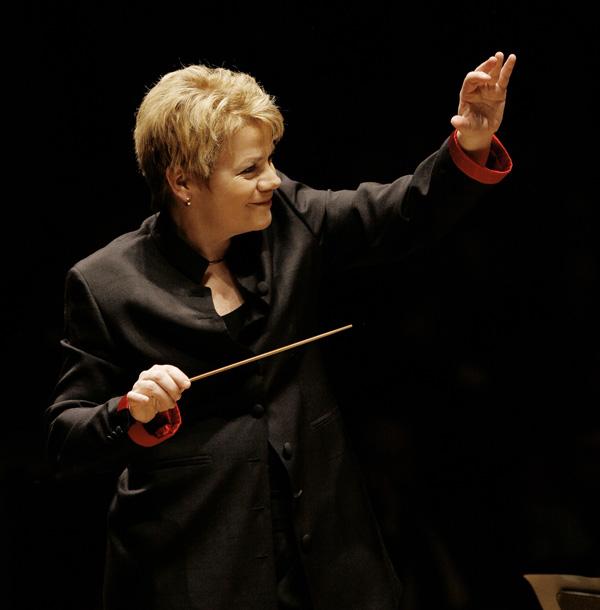In a couple of weeks Marin Alsop will become the first woman ever to conduct the Last Night of the Proms. Yesterday's programme of 19th century works by Brahms and Schumann, on the fifth of the eight Saturday nights of the season, thus had its Proms-specific raison d'etre, a signpost towards that history-making final Saturday. Just as the last night's high jinks have their own, ordered traditions, the Proms planners definitely enjoy giving a self-referential logic to the season.
The programme, which Alsop conducted entirely from memory, was a cleverly constructed juxtaposition of works which had D minor restlessness as their default mode. Brahms' Tragic Overture mostly stays in that key, and both Brahms' Ein Deutsches Requiem and Schumann's Fourth Symphony contain movements in which D minor brooding gives way to brazen D major.
The young soloists were also responsible for some transformative moments
The evening also marked well the contrast between Schumann's wilful genius and Brahms' focus and practicality. The elephant in the room was Schumann's Faust Scenes, completed in 1853, which also start with a D minor overture. Schumann's sprawling construct hardly ever gets performed, since it requires a large orchestra, seven vocal soloists and a boys' choir. In many ways it must have served Brahms well, getting him off the hook of any need to do justice to Goethe's Faust, and helping him to avoid many pitfalls when he came to write the Requiem, the longest-form work in his entire oeuvre.
The Schumann work in the programme was the D minor Fourth Symphony, in the standard, 1851 version. Alsop absolutely respected the markings and the architecture of the work. The last movement, admittedly, refrains from giving any instruction to move the tempo on, or to proceed to two in a bar until the switch to cut-common and the marking "schneller". So Alsop was clearly right to follow scrupulously that instruction to stay in four as the momentum gathers. That said, I felt I missed something of the organic flow, of the devil-may-care drama of Schumann's highly original symphonic construction.
Alsop brought out the smaller-scale episodes of the Schumann well, giving the space for some very fine individual contributions from members of the Orchestra of the Age of Enlightenment. Every phrase which North German oboist Michael Niesemann touched all evening seemed to turn to gold, and orchestra leader Kati Debretzeni's triplet meanderings were sheer delight.
Alsop has been quoted as saying that Brahms' Requiem is “an affirmation of life: it offers a very holistic, inclusive answer to those existential questions about what happens after this life, and where do we go.” There were indeed some life-affirming moments. The beguilingly repeated subjectless sentence fragment "selig sind", which book-ends the work, had exactly that rapt magic.
The young soloists were also responsible for some transformative moments. I thought the Dutch baritone Henk Neven brought out both the humility of "Herr, lehre doch mich" and the confident prophecy of "Siehe, ich sage euch ein Gehemnis" better than his counterpart on Alsop's new Naxos recording. Swiss soprano Rachel Harnisch imbued "Ihr habt nun Traurigkeit" with the right, limpid beauty. And no praise can be high enough for timpanist Adrian Bending. He made complete sense within the texture of those awkward, insistent continuous Ds at the end of the third movement.
In the pre-Proms talk earlier, Tom Service had looked forward to hearing the vivid colours in Brahms' orchestral writing. The bright sound of the natural horns - they had had slight mishaps in the Schumann - did indeed shine through, and the harps and eight energetic basses made telling contributions.
The audience reserved its most enthusiastic applause for the professional Choir of the Enlightenment, which delivered clarity and crispness. I found I missed some shaping in the phrasing, and words such as Jauchzet, Freude and Wonne could have done more to support Alsop's theory of the work. I also found that I missed the lift in the upbeat in 3/4 that conductors such as, say, Colin Davis and Eugen Jochum always brought to German music. A less smooth 3/4 bar makes the pointing of German speech rhythms more natural.














Add comment